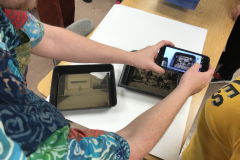Jenn Libby
Echoes from the Ether
Just like Icarus ignored the warnings of Daedelus, humans ignored the warnings of scientists. For over fifty years scientific evidence has been indicating that human activities were affecting the climate on planet earth and would have devastating results if not curtailed. The only home of humankind and innumerable other incredible life forms will likely become uninhabitable in a relatively short period of time because we ignored the warnings.
Echoes from the Ether is about witnessing this situation, and the emotions that result from this awareness—sadness, despair, anger, hopelessness, guilt, grief, confusion, and disbelief. I am not prepared to face the possibility of mass extinction. This is not an easy topic to talk about. No one wants to think about these things.
Echoes from the Ether continues my exploration of 19th and 20th century recording and communication devices through the images, the records, and the photographic process. It consists of two interrelated parts.
The End of the Record is a letter to Mother Earth composed with 45 rpm records and ambrotypes. The titles and images reflect my wonder of the natural world, and of human ingenuity and art. The audio installation by Joe Tunis is a composite of the runout grooves from these 45s.
Seeing is Forgetting is a set of camera-less images that record the shadows of translucent man-made objects using the wet-plate collodion process. As the analysis of the climate revealed climate change, the images reveal aspects of the objects not normally seen. These images act as a counterpoint to The End of the Record, inviting one to meditate on the present moment.
In 1977, at the peak of the environmental movement and the height of the popularity of records, NASA launched two Voyager spacecraft, each carrying a Golden Record containing voices and images of the people of Earth. These two records may be the last evidence of humans. How long will our voices echo through the ether? Will anyone hear us?

